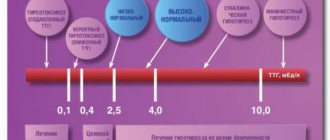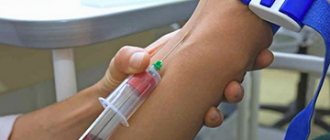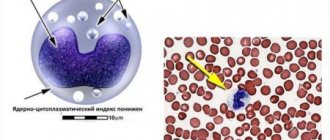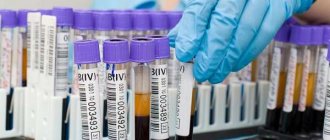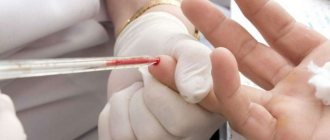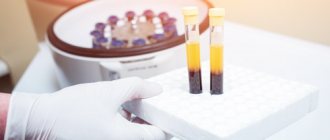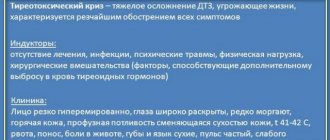Free T3 is the part of the total thyroid hormone T3 (triiodothyronine) not bound to proteins and is formed both during the synthesis from mono- and diiodotyrosine, and during the breakdown of the hormone T4 (tetraiodothyronine). T3, produced in a small volume (10% of T4), is a biologically active secretion of the thyroid gland and performs the functions of distributing energy and activating processes of nervous activity.
What kind of hormone is this
Triiodothyronine is synthesized and accumulated in the colloidal substance of the thyroid follicles, being part of thyroglobulin. Follicle cells bind iodine, forming mono- and diiodotyrosine (MIT and DIT) from the amino acid tyrosine; when MIT and DIT molecules combine, triiodothyronine (contains 3 iodine atoms) is formed, which is then released into the blood.
Less than 1% of the secretion is in free form, the remaining 99% is bound by plasma transport proteins. In the blood, individual molecules are located between the molecules of the associated secretion. Part of T3 is formed in the cells of the thyroid organ and other tissues from T4 as a result of the loss of an iodine atom. The active substance is unbound triiodothyronine, which is replenished from the reserves of the bound substance as it is used.
What is T3 free responsible for?
Triiodothyronine in an unbound form is responsible for the following processes in the body:
- stimulation of oxygen absorption by tissues;
- intensification of protein metabolism;
- increased heat generation;
- an increase in the amount of glucose in the blood;
- stimulation of the production of vitamin A in the liver;
- cholesterol reduction;
- stimulation of cardiac muscle contraction;
- calcium excretion;
- contraction of the intestinal walls;
- formation of alveoli;
- control of metabolic processes in bone tissue;
- increased red blood cell production;
- removal of toxic substances from the blood.
Functions and role in the body
Thanks to the peripheral tissues of the thyroid gland, an iodine molecule is separated from T4, converting it into active T3. Another 20% of triiodothyronine is synthesized by the gland separately. About 0.5% of the hormone entering the blood remains in free form.
Free T3 performs certain functions in the body:
- controls the amount of cholesterol in the blood;
- nourishes tissues with energy and oxygen;
- provides a normal temperature for the body’s functioning;
- promotes the excretion of calcium salts by the kidneys;
- participates in the synthesis of vitamin A by the liver;
- accelerates protein and carbohydrate metabolism;
- improves the process of restoration of bone structures;
- takes part in the process of embryo formation in pregnant women.
When the level of free T3 deviates from the norm, a person’s general well-being suffers. The balance of other thyroid hormones is disrupted. All this becomes the impetus for the development of pathological changes that are dangerous to health. In children, physical and mental development is strongly related to the production of thyroid hormones. If their synthesis is disrupted, central nervous system diseases develop and the child’s growth slows down.
What does the CA 125 tumor marker show and for what symptoms is it necessary to take the test? We have the answer!
Read about the first signs of inflammation of the thyroid gland and methods of treating the disease at this address.
Analysis
The test for free T3 is carried out by a laboratory method and determines the content of triiodothyronine in the blood serum. For better diagnosis, tests for the hormones T4 and TSH are simultaneously prescribed.
To eliminate errors when determining hormone levels and to properly prepare for the analysis, you must follow the following rules:
- donate blood before 10 a.m. on an empty stomach (8-12 hours after eating);
- eliminate physical and emotional stress per day;
- 3 days in advance, stop taking medications (including iodine-containing) medications;
- stop taking hormonal medications one month before;
- eliminate alcohol intake (per day) and smoking (at least 1 hour before);
- 2 days before the analysis, exclude physical procedures, ECG, ultrasound, and x-ray studies.
Increased performance
In most cases, triiodothyronine increases due to an overactive thyroid gland. This occurs under certain conditions:
- diffuse toxic nodular goiter;
- subacute thyroiditis;
- toxic adenoma;
- TSH-producing pituitary adenoma.
Simultaneously with triiodothyronine, thyroxine increases. In exceptional cases, an isolated increase in T3 occurs (for example, with T3 thyrotoxicosis).
What and how to treat breast fibroadenoma? View a selection of effective treatment options.
Read about what nutritional hyperparathyroidism is and methods of treating the disease at this address.
On the page https://vse-o-gormonah.com/vnutrennaja-sekretsija/polovye/zheltoe-telo-v-yaichnike.html learn about the reasons for the formation of a corpus luteum cyst of the left ovary and how to remove the formation.
Since free T3 is a fairly active substance, its high level in the blood is manifested by characteristic symptoms:
- excessive irritability, nervousness;
- increased fatigue;
- tremor of fingers;
- rapid pulse;
- tachycardia;
- rapid weight loss;
- tearfulness;
- fear of light.
Often the analysis result is erroneous. If the TSH level is normal and free T3 is elevated, then, in most cases, this is unreliable information about the clinical picture of the condition. A high T3 level with a low T4 level can also be considered an error. In such cases, it is advisable to retake the blood test.
READ ALSO: Somatotropin or somatotropic hormone: what is it and how to restore the level of the peptide regulator of the anterior pituitary gland in case of abnormalities
Norm of the hormone triiodothyronine free
The norm of unbound triiodothyronine in women and men aged 20-50 years is 3.10-6.80 pmol/l; in older age, the figure decreases to 2.80-6.00 pmol/l. Compliance with the norm shows that the thyroid gland is functioning correctly. During pregnancy, especially in the first trimester, the amount of T3 increases, reaching the upper limit of normal or exceeding it.
In children, the triiodothyronine level depends on the development of the hormonal system and reaches approximately adult levels by adolescence. In a child aged 4-6 years, the secretion is within the range of 2.50-9.80 pmol/l, at 9-10 years old - 2.00-22.90 pmol/l, at 15 years old - 3.50-7.10 pmol/l.
T3 general
Total triiodothyronine is the total content of the bound and free portion of the hormone in the blood. In order to understand the specifics of its interaction with tissues and organs, it is necessary to first delve into the very concept of this substance.
So, T3 is an active hormone produced, like many other hormones, by the thyroid gland. “Troika” in the abbreviation of its name means that there are three iodine atoms in one molecule of this compound. It is noteworthy that triiodothyronine is formed during the breakdown of T4 - thyroxine, the molecule of which, accordingly, initially contained 4 iodine atoms.
This hormone is involved in the following processes:
- lipid destruction;
- absorption of carbohydrates;
- regulation of mitochondria;
- production of vitamin A and regulation of mineral metabolism;
- maintaining normal body temperature;
- synthesis of proteins and acids.
Important! T3 stimulates intellectual development in childhood, improves memory and concentration, and prevents the development of atherosclerotic pathologies in adults.
In addition to what has already been listed, the functions of triiodothyronine include the regulation of energy metabolism and the transport of necessary substances to cells. Insufficient levels of T3 in the blood can lead to a number of problems in the body.
There are certain standards for the content of this hormone in the blood of a healthy person. Its amount depends on age, is measured in nmol/liters and can vary within normal limits from 1.3 to 6.3 nmol/l in children under 1 year of age.
Important! The T3 content in the female body is, as a rule, 5–10% lower than in the male body. During pregnancy this figure will be even lower. In both sexes, the level of this substance in the blood steadily decreases after 65 years.
In addition, the quantitative indicator of triiodothyronine content may depend on lifestyle. Thus, it can be affected by the presence or absence of physical activity, the use of drugs and alcohol, stress, and taking certain medications. When considering the results of the analysis, the doctor also takes into account the current time of year: during the summer, the amount of T3 in the blood decreases slightly in all people, regardless of age and gender.
Deviations from the norm
Deviations in hormone concentrations from the norm reflect the process of dysfunction of the body and affect the functioning of all organs and systems. A condition in which triiodothyronine levels are low is characterized by the following symptoms:
- constant weakness and fatigue, sleep disturbance;
- weight gain with decreased appetite;
- decreased attention and speed of thinking;
- swelling of the face, arms and legs;
- pale skin;
- reduced body temperature;
- convulsions.
If T3 is elevated, the following symptoms appear:
- low-grade fever;
- weight loss with increased appetite;
- increased blood pressure, rapid pulse;
- sudden change of mood;
- tremor;
- dyspnea;
- headache;
- splitting nails, brittle hair;
- diarrhea, frequent urination;
- disorders of the female cycle.
Causes
A low level of free triiodothyronine is caused by dysfunction of the thyroid gland, when, as a result of diseases (thyroiditis, neoplasms), hypoproductivity of the endocrine organ develops (primary hypothyroidism). Another reason for decreased secretion may be dysfunction of the pituitary gland and hypothalamus, under the control of which the production of thyroid substances occurs (secondary and tertiary hypothyroidism).
A decrease in triiodothyronine levels can occur due to improper use of medications and iodine-containing drugs or due to inadequate treatment with radioactive iodine.
The reason for the high T3 value (in 90% of cases) is hyperfunction caused by diseases of the thyroid organ (primary hyperthyroidism). The state of hyperthyroidism occurs with the development of diffuse toxic (most cases) or nodular toxic goiter, with hashitoxicosis and various types of thyroiditis (inflammation), with the appearance of temporary thyrotoxicosis in pregnant women.
Thyroid gland and alcohol: is it worth using? What is dangerous about increased antibodies to thyroid peroxidase? How to lower TSH without hormones? More details>>
An excess of unbound triiodothyronine is also caused by other reasons other than hyperfunction:
- overdose of L-thyroxine and iodine preparations;
- exposure to medications (Amiodarone, Interferon);
- diseases of the pituitary gland and hypothalamus (secondary and tertiary hyperthyroidism);
- ovarian tumors;
- increase in human chorionic gonadotropin (hCG).
Treatment
If there is a deficiency of triiodothyronine, hormone-containing drugs (replacement therapy) are prescribed, which are selected individually. If conservative treatment does not provide the desired effect, then surgery may be required. If the deficiency is caused by iodine or medications, these medications should be carefully monitored.
To lower triiodothyronine levels, complex drug treatment is used, including the use of drugs that reduce hypersecretion, the use of sedatives and vitamin preparations, and radioactive iodine therapy. If the high T3 value is not caused by hypersecretion, treat the underlying disease and monitor the intake of hormonal drugs. If conservative methods are ineffective, surgical treatment is used.
Who should test for T3 hormone?
This test is prescribed by a general practitioner or endocrinologist in the following cases:
- for differential diagnosis of diseases associated with thyroid pathologies;
- for control in the treatment of thyroid diseases;
- to monitor the effectiveness of hormone replacement therapy;
- to clarify the diagnosis if the analysis showed a low level of another thyroid hormone.
Deviations in the free T3 level always manifest themselves symptomatically; it is impossible not to notice these manifestations:
- sudden and frequent mood changes;
- prolonged and frequent headaches;
- outbursts of anger for no reason;
- low or high temperature;
- problems with stool;
- weight loss or gain with a unchanged diet;
- irregularities in the menstrual cycle;
- increased sweating;
- shortness of breath even with minimal exertion.
Deviation of T3 and T4 in women in one direction or another provokes the development of hyperthyroidism or hypothyroidism; the symptoms of these diseases will have both similar and different manifestations.
For hypothyroidism:
- hair fall out;
- clarity of thinking is lost;
- a goiter appears;
- heartbeat slows down;
- there is severe fatigue;
- increased sensitivity to cold;
- weight increases;
- swelling appears;
- problems with stool include constipation;
- the menstrual cycle is disrupted;
- muscle and joint pain is noted;
- cholesterol levels rise.
For hyperthyroidism:
- hair fall out;
- eyeballs bulge;
- a goiter appears;
- heart rate increases;
- tremor appears;
- there is heat intolerance;
- sleep is disturbed;
- weight loss;
- shortness of breath appears;
- problems with stool include diarrhea;
- appetite increases;
- the menstrual cycle is disrupted;
- sweating increases;
- depression develops.
Low hormone levels
A decrease in free T3 occurs when the synthesis of all thyroid hormones is disrupted. The reasons for this condition may be:
- Hashimoto's thyroiditis - the immune system begins to perceive gland cells as foreign and destroy them;
- hypothyroidism - a decrease in thyroid function, which can occur, for example, while taking hormonal drugs for the treatment of nodular or diffuse goiter, or other causes;
- exposure to radioactive iodine or taking medications with iodine (Amiodarone, Cordarone);
- after surgery for partial or complete removal of the thyroid gland;
- following a low-calorie diet for a long time;
- heavy physical activity.
First, there is a decrease in the concentration of thyroxine, against the background of which T3 falls. The process is accompanied by negative symptoms:
- weakness;
- drowsiness;
- weight gain;
- hypotension;
- deterioration of brain activity;
- disruptions of the menstrual cycle in women;
- depressive states;
- dryness and swelling of the skin;
- decreased libido;
- hypercholesterolemia.
In aunts with a significant deficiency of free T3, cretinism often develops; in adults, myxedema occurs. But with timely treatment, such complications can be avoided.

